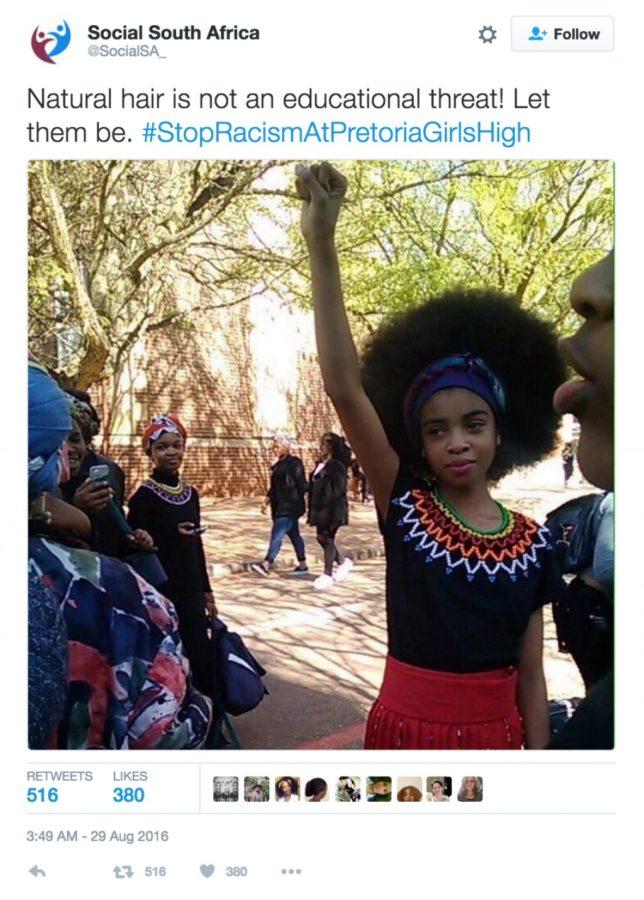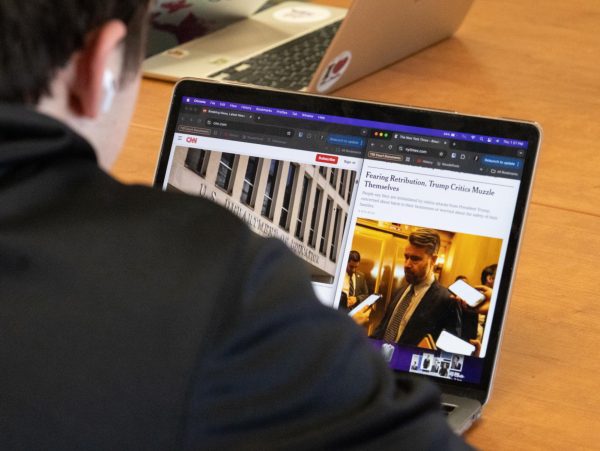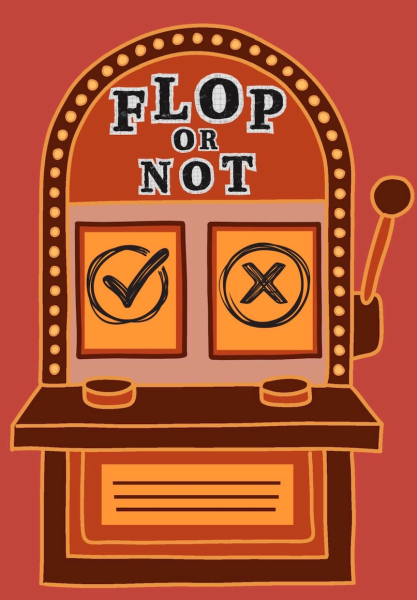Racism or just rules?
The U.S. Court of Appeals allows employers to ban natural hair
Photo: Twitter
Students protest unfair hair rules in Pretoria, South Africa. The protest was documented on Twitter for the world to see.
“Hair is political.”
These are the words of Charles M. Blow’s daughter, as stated by him in his New York Times OP-ED, “Age of Identity.”
In a day and age in which more and more African Americans are embracing their natural hair, something that is widely viewed as controversial by school administrators and employers, it is easy to see why this statement is true. Many individuals are choosing to abandon hair extensions and hair-straightening chemicals in favor of locs, braids, afros and other Afrocentric hairstyles. Sporting these styles in their everyday lives means they are wearing them in their schools and workplaces, which has presented a problem for many administrators and employers.
One such example is the 2013 case of Tiana Parker, who was seven when she was reprimanded at her school for wearing locs. According to the Huffington Post, her mother pulled her out of her Oklahoma elementary school, Deborah Brown, after administration deemed her hairstyle “unpresentable.” A petition was created that called for the school to both publicly apologize to Parker and her family as well as dismantle rules about hair that some people in the town deemed unfair.
“The fact remains that two of the hairstyles spelled out as being unacceptable in this school’s policy are worn almost exclusively by African-Americans with natural hair,” the petition stated.
A more recent example of this type of incident occurred in South Africa, which reminds us that antiblack sentiments affect many places indiscriminately.
The Pretoria High School for Girls, located in Pretoria, South Africa, has a history of telling black students to “fix” their hair and to make it more presentable for school. According to BBC, the school has strict rules about hair that avoid explicitly stating that they target black hairstyles specifically. Despite this fact, the Washington Post states that many students have made claims to the Gauteng Department of Education about faculty members regularly telling them that they “look like monkeys or have nests on their heads.”
In August of this year, a group of students from Pretoria High School for Girls banded together in protest of these antiquated rules and hateful comments. At the forefront was 13 year old Zulaikha Patel, who says that controversy about her natural hair has followed her for her entire life. Pretoria High School for Girls was founded in 1902, in the midst of South African apartheid, and only had white students before being integrated in 1990. As a result, the school’s rules and standards of appropriateness reflect the Eurocentric ideas present at the time of its founding.
However, schools are not the only places where black people’s hair has become a debate. They also fall victim to the same type of prejudices in corporate environments. Most recently, a U.S. Court of Appeals ruled that it is not, in fact, racial discrimination when employers fire their black employees for choosing to wear their natural hair.
According to the Huffington Post, the court is making a clear distinction between discriminating between afro-textured hair itself and historically Afrocentric hairstyles.
Circuit Judge Adalberto Jordan claims that the way Black people style their hair is a choice, so it is not unconstitutional for them to be banned from wearing certain styles.
“Discrimination on the basis of black hair texture, an immutable characteristic, is prohibited by Title VII, while adverse action on the basis of black hairstyle, a mutable choice, is not,” Jordan said.
With all of the controversy, it is clear that most people are missing one important point: not only are Black hairstyles integral to Black culture itself, but by deeming these hairstyles, most of which naturally occur in Afro-textured hair, as unprofessional or unkempt, you are marginalizing the innate features of an entire race of people. Although locs and braids are indeed choices, they are choices made by black people that express pride in their heritage and are methods of keeping their specific hair texture neat and healthy. Afros and puffs simply grow out of their heads that way. What are they to do about that?
To suggest that black people should straighten, cover or contain their hair is to suggest that they should contain their identities. It is to suggest that they must fit certain standards to earn their place in white society. And, most of all, it is to take away their autonomy to live their lives as they are naturally and to try and rework what nature has already put its paintbrush on.












